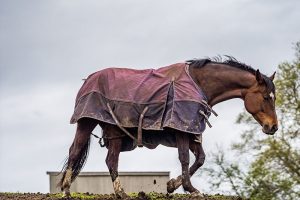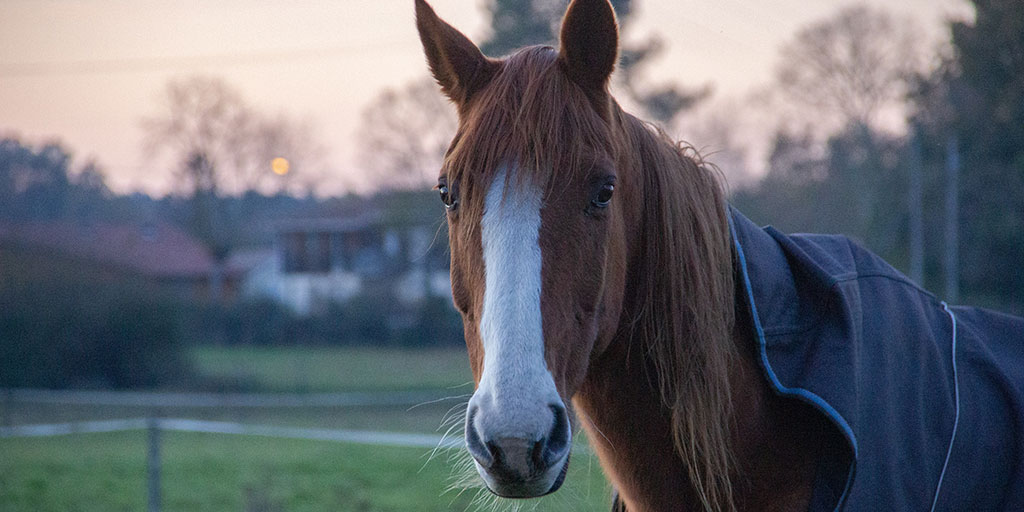Winter has well and truly arrived, and our big and small animals are definitely noticing the dip in temperature. Older horses (aged 15 years and over) are particularly affected by colder weather and will need some extra support and special care over these colder months.
Here are a few key tips from the Cameron Veterinary Services’ team to help keep your senior horse warm and healthy this winter.
Increase their feed
As horses get older, they have trouble regulating their body temperature – so in winter, they require more energy to keep themselves warm. And the best way to keep your horse warm is through food. A high-fibre feed – such as pasture, hay, or chaff – is best, as it will generate more heat during the digestive process compared to lower-fibre feeds such as corn or barley.
You will need to increase the amount of feed you provide your horse during colder months. Senior horses tend to be on the thinner side, so it’s important that you offer extra food during winter to not only help them produce heat, but to also add an extra layer of fat to protect them against the cold. But be careful to not go overboard and overfeed your horse. Adequate nutrition during winter can be a tricky balance, so if you have any concerns or questions, feel free to get in touch with our team.
Provide plenty of water
Ensuring sufficient water intake is just as important in winter as summer for older horses. While they make be reluctant to drink as much as they need due to the cold temperature of the water, it’s critical that your horse doesn’t become dehydrated. Regularly replace their clean water to avoid it frosting over on cold mornings – use warm water if at all possible. And if you’re concerned about your horse not drinking enough, you can always provide them with some water-soaked feed.
Invest in a few different blankets
 If your senior horse is out in the elements during winter, they will need to be blanketed. But it’s important that you don’t make them too warm, and risk sweating under the blanket which will eventually make them even colder. It’s well worth considering buying a few well-fitting blankets in different weights to suit a range of winter temperatures. You can even layer blankets to add some extra warmth. Just make sure that you remove any blankets regularly to keep an eye on your horse’s weight and check their skin for any sign of disease or rub marks.
If your senior horse is out in the elements during winter, they will need to be blanketed. But it’s important that you don’t make them too warm, and risk sweating under the blanket which will eventually make them even colder. It’s well worth considering buying a few well-fitting blankets in different weights to suit a range of winter temperatures. You can even layer blankets to add some extra warmth. Just make sure that you remove any blankets regularly to keep an eye on your horse’s weight and check their skin for any sign of disease or rub marks.
Watch their health carefully
Like any animal (or human for that matter), horses are more susceptible to serious health issues as they get older. The stress of cold weather can exacerbate any illness your horse may be suffering from, so it is important to be extra vigilant in keeping a close eye on any signs of ill health. The main issues we tend to see with older horses in winter include respiratory illness, dental problems affecting their eating (leading to weight loss), colic, and arthritis.
Keep an eye on their teeth
Older horses are prone to having more dental issues, such as missing teeth, sharp tooth points and uneven wear. These issues make it especially difficult to chew properly, which means they will miss out on all the nutrients in their food and can rapidly lose condition during colder weather.
Don’t dismiss the importance of de-worming
Parasite control is especially important in senior horses with parasitic burdens playing a huge role in weight maintenance. Discussing a regular Faecal Egg Count and de-worming protocol is vital in controlling these worm populations and the resistance we are starting to see to our medications. At Cameron Veterinary Services we provide Faecal Egg Counts in-house in order to assess your horse’s worm burden.
Winter healthcare advice
Every horse is different, and some will cope better than others during winter. The Cameron Veterinary Services offers a special winter healthcare package to make sure your senior horse is kept in top shape during these colder months. During our visit we will discuss weight and feeding, de-worming, dentistry and rugging as well as addressing any specific concerns or questions you may have.
For further information or to book a consult, call us on 08 8318 1801.



